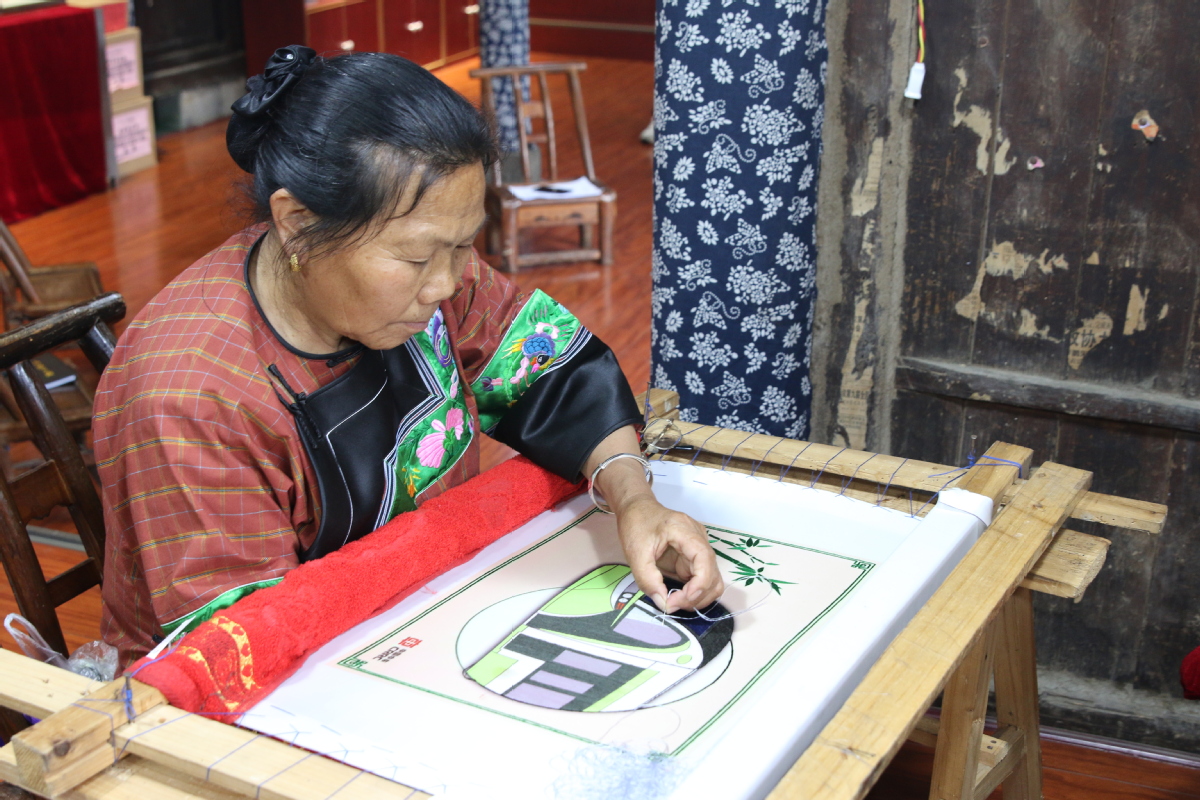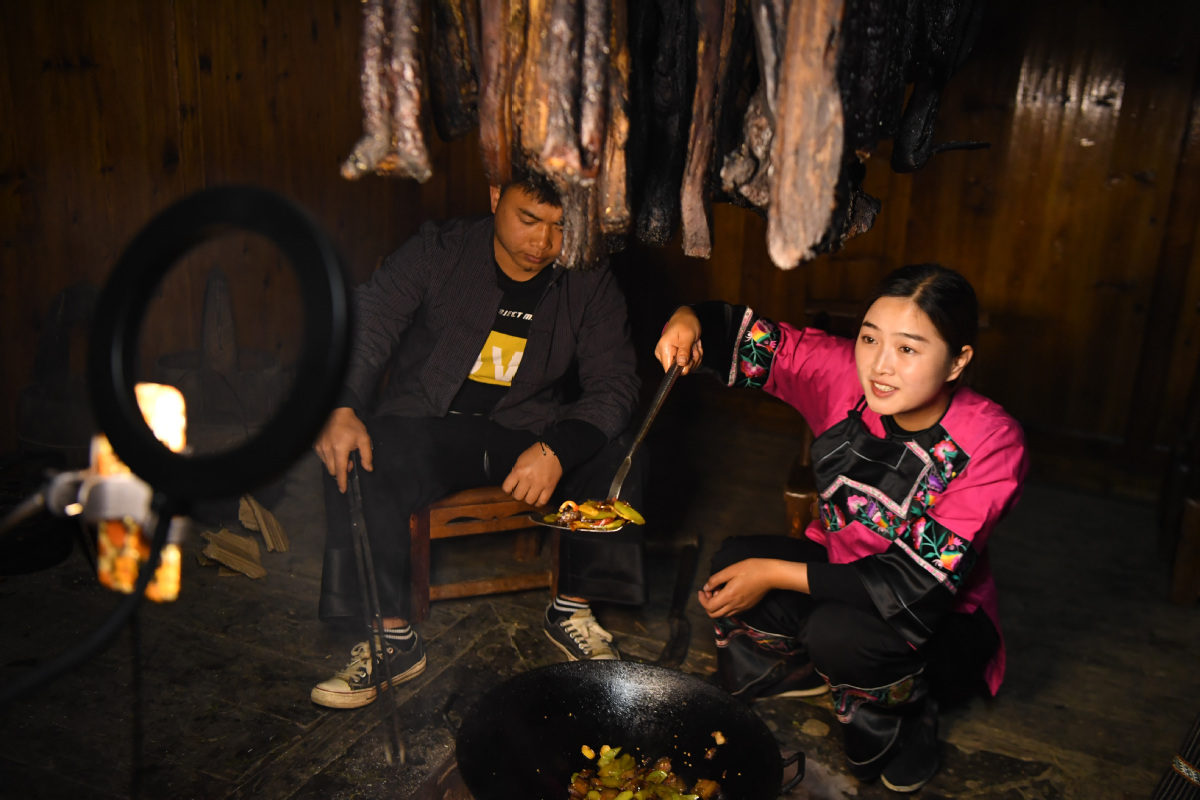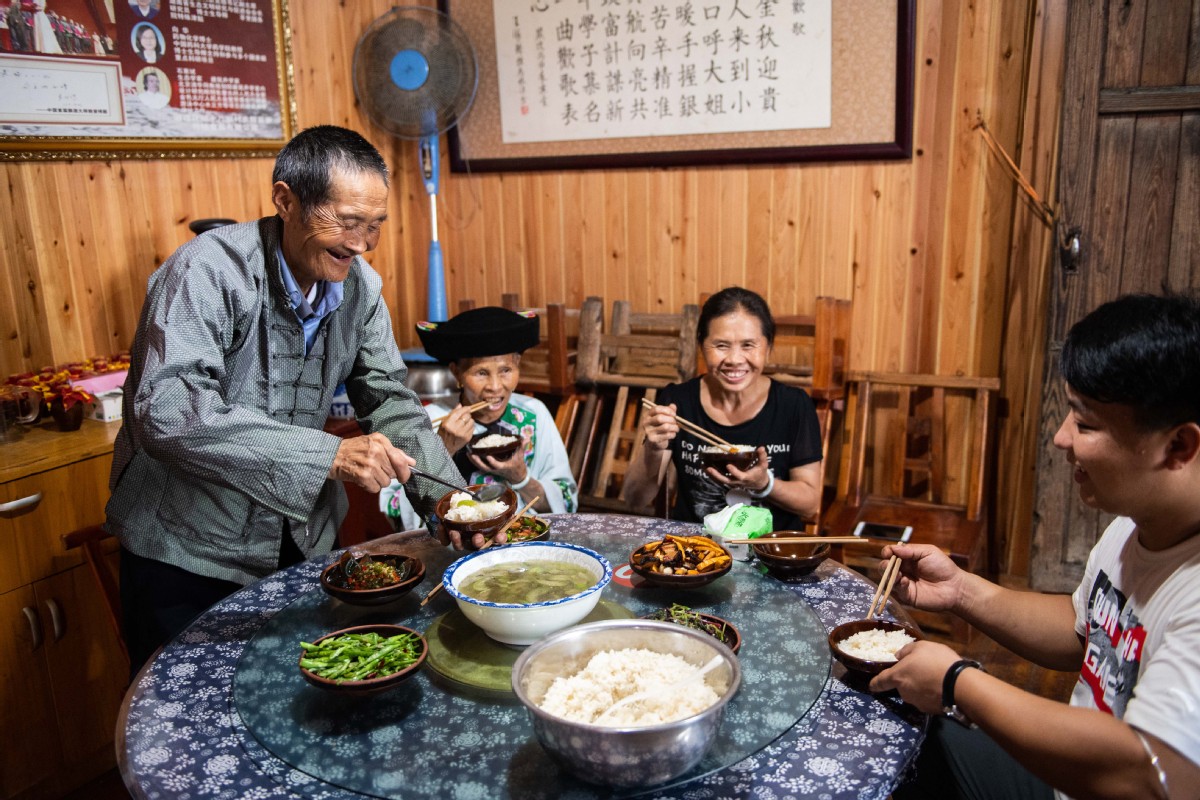
Editor's note: With China set to meet its goal this year of eliminating extreme poverty before next year's 100th anniversary of the founding of the Communist Party of China, this series looks at the efforts of different areas of the country to erase poverty and improve livelihoods.
The young woman is dressed in striking local ethnic attire, with matching embroidered pink-green sleeves and pants. She sits next to a traditional huotang open hearth, feeding it generously with firewood to keep the flames burning bright.
"This is our way of keeping warm. The huotang can be used to make larou (Chinese bacon) at the same time," she said, pointing to the mouthwatering strips of salted pork hung over the fire for smoking.
Shi Linjiao, 24, is not just introducing a local delicacy to visitors. She is part of a scene in a video being shot at Shibadong, a village of the Miao ethnic group in the Xiangxi Tujia and Miao autonomous prefecture, Central China's Hunan province. Shibadong is named after the village's 18 natural caves.
Shi returned to Shibadong after she graduated last year from the Zhejiang Conservatory of Music in Hangzhou, capital of East China's Zhejiang province, and had a job at Liuyang, a county-level city in Hunan. She quit the job several months later to go back to her hometown.
The video is part of a series used to promote her hometown. Shi herself is tasked with appearing on camera, while other village returnees Shi Zhichun plans the programs and Shi Kang edits the clips.
Shi Kang once worked in the field of new media in Changsha, capital of Hunan, before he was inspired by Shi Zhichun's idea of starting their own business at their hometown last year.
The trio returned from cities after graduating from their respective colleges since 2017. Once back home, they decided to work together, promoting their hometown to the outside world through modern communication channels.
Like many other impoverished remote areas in the country, the village is located amid the highlands, in the Wuling Mountains endowed with breathtaking scenery and clean water, but having inadequate transportation and other infrastructure.
Villagers used to rely on the little income they could reap from crops, including corn and rice, planted on scattered farmland.
Shi Zhichun, who earned a graduate degree at Jishou University in Jishou, Xiangxi Tujia and Miao autonomous prefecture after majoring in English as an undergraduate at the Central South University in Changsha, chose to leave the city to return to Shibadong following his studies in 2017.
Attracting tourists
"I want to make my hometown known to the rest of the world, so that tourists can be attracted here and Miao villagers' specialties can be sold online," the 31-year-old said.
He soon figured out an effective way to promote Shibadong's attractions and specialties, by posting short videos and livestreaming on major social networking platform Douyin.
"Through the videos, we can show the culture and traditions of the Miao ethnic group, such as our activities in the field, our cuisine and our songs and dances," he said.
It did not take long for the increasing number of fans of the trio's videos to start buying the larou products made by households in the village.
Shi said they have been selling hundreds of kilograms of the meat, with the villagers earning about 60 yuan ($8.5) for every kilogram of larou they sell.
Other local agricultural products, including peppers, rice wine and kiwis, are also being sold through the digital platforms. Their account on Douyin has attracted more than 90,000 fans, Shi said.
He is planning to set up a company to sell more local produce, with even a food processing factory in the future.
The village returnees are not the only ones to embrace a bright future for Shibadong.
Sitting on a workbench, Shi Shunlian deftly threads a needle through a spread of fabric-she is stitching an elaborate scene of a high-speed train, in white and black.
Shi, 66, is a former Party chief at Shibadong. After retiring in 2014, she picked up miaoxiu (traditional ethnic embroidery) hoping the skill can help the needy villagers earn some additional income.

A visit by president
She recalled that President Xi Jinping, who is also general secretary of the CPC Central Committee, visited the village in 2013. At the time, 57 percent of the 939 villagers were living below the national poverty line of 2,300 yuan ($328), with their per capita disposable income at 1,668 yuan.
"I felt sorry when he asked how much our villagers could earn in a year," Shi said, adding that she had been at the post since 1997 but the village still remained poor due to the tough natural conditions.
Shi Shunlian wanted to continue helping the village to fight poverty after her retirement, by organizing housewives to make miaoxiu and selling them as arts and crafts.
Miaoxiu, which features rich and splendid colors and various figures and lines, is among the first traditions of its kind listed as a national intangible cultural heritage.
"In this way, we can preserve Miao people's cultural inheritance and use it to help improve our lives," she said, adding that the traditional activity is in danger of fading out of their community.
She remembered how Miao girls traditionally learned to embroider from their mothers and grandmothers at a very early age.
"We stitch various shapes like butterflies and flowers onto fabric and use them to make different items, including clothes, pillowcases, handbags and wall hangings," Shi Shunlian said, as she pointed to the train pattern on the Miao embroidery she was working on.
The piece of miaoxiu work she is stitching carefully at her workbench will be given as a present to the foreign customers of CRRC Zhuzhou Locomotive, a major manufacturer of rail transit equipment in Hunan.
As the biggest buyer of the ethnic craft since 2018, the company has been placing orders for Miao embroidery works worth 100,000 yuan each year from the cooperative that Shi set up in May 2014.

Cooperative formed
Under her lead, more than 190 housewives have joined the cooperative for producing handmade Miao embroidery works in the past six years. Each of them can earn about 3,000 yuan during busy months.
The cooperative's Miao embroidery products have received more orders as a result of the growing interest. But Shi still worries about their work.
"There aren't enough orders to keep us busy through the whole year and there is a dearth of talent to provide designs for the embroidery. These are the two major problems," she said.
"We will improve our products, adding items like purses, bookmarks and hats; we will go out to promote them and we are hoping to find designers," Shi said of her plans.
The villagers' efforts to tap local culture for improving lives is in line with "targeted poverty alleviation", a concept first put forward when Xi visited the then poverty-stricken village on an inspection tour in November 2013.
The concept includes precisely identifying impoverished residents and cultivating suitable businesses to help locals eliminate poverty and to thrive, requiring relief measures tailored to different local conditions.
The approach has become a guiding principle in the country's effort to eradicate poverty by the end of this year.
Other than tapping ethnic tradition, Shibadong has also developed other suitable industries based on its scenic beauty and other natural resources, such as rural tourism and agricultural products.
"We have advantages to develop rural tourism, with our special Miao culture, picturesque valleys and rich ecological resources," said the village's deputy director Long Jilong.
The village renovated its infrastructure first, including roads, power grids, residential buildings and tourism facilities.
To fully develop tourism, the village brought in a leading tourism company in 2018 to manage the industry and provide standard services.
Last year, the village received more than 600,000 visitors, twice the number compared with the year before.
"The booming tourism has provided many opportunities for residents to boost their income," Long said.
More than 200 villagers have become involved in the tourism sector, including operating restaurants and guesthouses, working as tour guides, shuttle bus drivers, security guards and cleaners, or selling local specialties to tourists.
New sources of wealth
"Villagers are now enjoying better living conditions and have found new sources of wealth," Long said.
In 2016, Shibadong shed its poverty label, with villagers' per capita income reaching 8,313 yuan, significantly higher than the national poverty line of about 3,000. In 2019, per capita income in the village reached 14,668 yuan, almost nine times the level in 2013.
The transformation has attracted over 200 young people back to Shibadong, which was called a "hollow village" in the past because most young people went out to the big cities to find jobs, leaving their elderly parents and children at home, Long said.
"Developing various suitable industries is key to the village's future," said Sun Zhongyuan, the current Party chief of Shibadong.
Based on local weather and geography, villagers also found kiwi fruit to be a suitable crop.
But limited cultivable land, with one resident owning less than 1 mu (0.067 hectares) on average, had prevented the village from growing kiwi on an industrial level.
In 2014, Shibadong rented 1,000 mu of land from a neighboring village to develop kiwi farming, with villagers able to get a share of the farming profits at the end of a year.
With abundant natural mountain spring water, Shibadong also brought in a water company, which taps the village's land and water resources, sharing its profits with the village.
In 2019, the village received more than 600,000 yuan of profit share from the water company, Sun said.
While some villagers are benefiting from the collective industries, others are continuing to find their own business opportunities.
One of them, 33-year-old Long Xianlan discovered that the village's lush greenery offered the perfect conditions for raising bees.
Starting from 2015, Long gradually grew his beekeeping enterprise. His initial four boxes of bees have grown to more than 300 crates, helping him rake in an annual income of 400,000 yuan last year from just a few thousand yuan before 2015.

Successful venture
Before his successful foray into apiculture, Long was known as an orphan in difficult circumstances-his mother left the family when he was a little boy, his father died when he was 18 and his younger sister succumbed to disease soon after. Demoralized by the hardships, Long kept himself in a drunken stupor almost every day.
Fortunately for him, Long, inspired and supported by poverty alleviation measures, began to work hard at his beekeeping. The business increased his income and helped him attract his future wife from a neighboring village.
"I met her at a blind date event organized in Shibadong, but her family opposed our relationship due to my poverty at the time," Long said. He waited a year until his apiculture business started yielding profits and succeeded in a marriage proposal in 2016.
The honey business has also benefited other villagers. More than 560 residents in Shibadong and neighboring villages joined a beekeeping cooperative led by Long, over half of whom used to be stricken by poverty with their per capita income less than 3,000 yuan each year.
With the development of suitable industries and businesses, villagers in Shibadong can get jobs and make a decent living right at their doorstep.
Long Xianlan said the opportunities he tapped from beekeeping have turned him from a despondent, aimless pauper into a responsible husband providing for a happy family that fully enjoys the warmth and comforts of home.
"My life now is sweeter than the honey I make," he said.
Song Jinliangcontributed to the story.
来源:China Daily
作者:Feng Zhiwei
编辑:尹曾祺